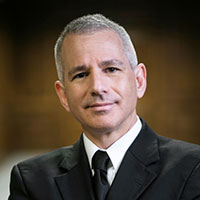Fitness instructors repeat what we all hear for years: to redeem the sin of gluttony can be on the treadmill. And this message is spread by the fitness guru, the stars, food and beverage companies, health officials and doctors.
Due to the belief that the sport will help you lose weight, you can successfully buy tickets to gyms, fitness trackers, sports drinks and video with training.
But the trouble is: this confidence is based on false ideas and deceives us in our fight against excess weight.
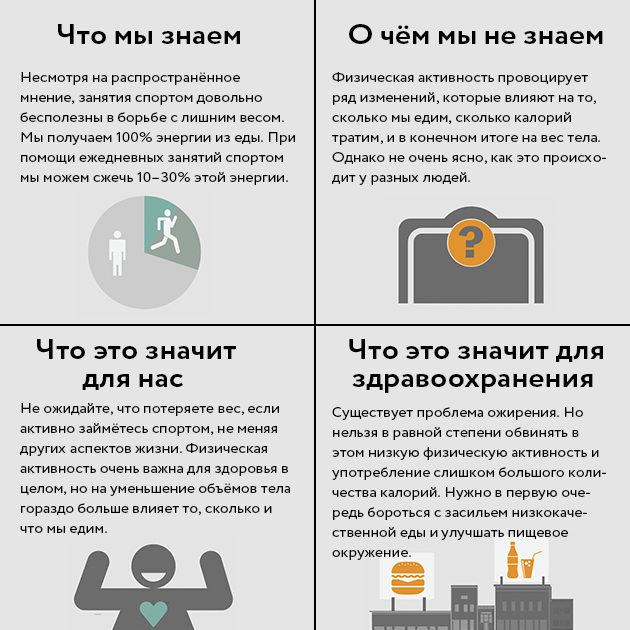
How does our body burn calories: is there a difference between an office worker and a resident of a wild tribe
Anthropologist Herman Pontzer from Hunter College in New York went to Tanzania to study the Hadzah tribe – one of the few remaining tribes of hunters and gatherers. He expected to see in these people machines for burning calories, because in their lives of physical activity is much greater than that of residents of Western countries.
Most of the time, the men of the Hadza tribe are catching up and killing animals, as well as climbing trees searching for honey of wild bees. Women collect roots and berries.
Studying the way of life of hadza, Pontzer was sure that he would find a common opinion: obesity became a world problem because of a strong decrease in physical activity. Pontzer was convinced that Hadza burned far more calories a day than the average Westerner.
In 2009 and 2010, researchers traveled the savannah, stuffing their jeep with computers, liquid nitrogen to freeze urine samples, and respirometers to measure the energy expenditure of the tribe’s people.
Scientists documented physical activity and the amount of energy expended in 13 men and 17 women aged 18 to 75 years using the tagged atom method – the most well-known way to measure the amount of carbon dioxide that we extract by consuming energy.
The results were astonishing: the energy consumption of the representatives of hadz was no more than that of Europeans or Americans. Hunters and gatherers were more physically active and lean, but the day burned the same number of calories as the average citizen of the West spends.
The study of Pontzer was superficial and incomplete: only 30 people from a small community took part in it. But it raised a painful question: why do the Hadza, who are constantly on the move, spend as much energy as the lazy Europeans?

Energy (calories) is spent not only on movement, but also on supporting life. Researchers have long known about this, but did not consider this fact significant in the context of the global epidemic of obesity.
Pontzer suggested that hadza spend the same amount of energy, because their body saves it on other tasks. Or, maybe, the hadza rest more after physical labor, which allows to reduce the total energy expenditure.
Science is still developing in this direction, and there are serious consequences for our understanding of how much energy expenditure and the extent to which we can influence it through exercise are strongly related.
This fundamental concept is part of a growing pool of evidence that explains the phenomenon that scientists have been observing for years: it is very difficult to lose weight by simply increasing the amount of exercise.
Physical activity excellently heals
Before you start to understand why the exercises will not help you lose weight, let’s clarify something: no matter how the exercises work on the volume of your waist, they heal the body and mind.
The Cochrane community of independent researchers prepared an overview of available studies demonstrating that while physical activity resulted in only modest weight loss, subjects who did more without even changing the diet noted improvement in health, including a reduction in blood pressure and triglyceride levels in the blood . Exercise reduces the risk of developing type 2 diabetes, stroke and heart attack.
A number of other studies have shown that people involved in sports have a reduced risk of developing cognitive impairment from Alzheimer’s disease or dementia. They also get higher marks in intellectual tests. If you have lost weight, exercise combined with controlling the amount of calories consumed will help maintain it at this level.
Unsupported exercises are almost useless for weight loss
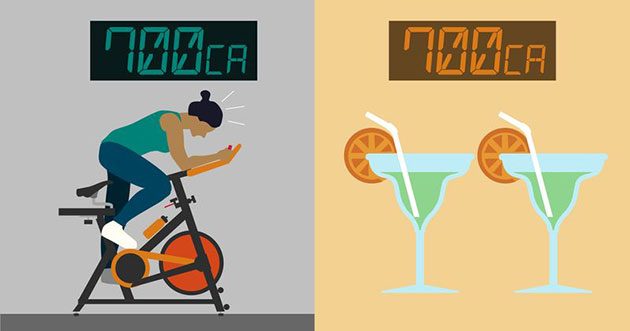
So, the benefits of physical activity are obvious and real. But despite the numerous stories of kilograms lost on the treadmill, the evidence says something different.
A study published by the National Center for Biotechnology Information of the USA (NCBI) in 2001 says that a short-term experiment lasting about 20 weeks showed weight loss, but in a long-term experiment (more than 26 weeks) burned during exercise, and weight loss.
We have long lived with the thought that the process of losing weight is simple: ate calories – spent calories. In the often cited study of 1958, scientist Max Wishnofsky outlined a rule that many clinics and journals still use to predict weight loss: a half-kilogram of human fat is about 3,500 kcal. That is, if you spend 500 kcal per day with diet and physical activity, you will lose about a pound of weight per week as a result. If you add 500 kcal per day, you’ll gain half a kilo.
Now researchers consider this rule to be too simple and speak of the energy balance of man as a dynamic and adaptive system. When you change something in it, for example, cut down the daily number of calories, add physical stress, this provokes a cascade of changes in the body, affecting how many calories you use, and ultimately – by body weight.
Professor David Allison of the University of Alabama believes that limiting the amount of calories consumed is more effective than increasing physical activity, and cutting calories in combination with exercise will work even better.
Exercises help burn only a small portion of calories
Very underrated is the fact that exercises burn only a tiny fraction of your total energy expenditure.
Three main directions of energy consumption
- The basic rate of metabolism is the energy used for the functioning of the organism, even when it is at rest.
- The energy spent on digesting food.
- Energy expended on physical activity.
We can not control the basic rate of metabolism, and this is the most significant energy expenditure.
Digestion of food takes up 10% of the total energy expenditure. The remaining 10-30% are spent on physical activity, where the exercises are only a part of it.
That is why it is not surprising that exercises lead to statistically significant, but small changes in weight.
It is difficult to create a significant calorie deficit with the help of sports
Using the “Human Weight Planner”, which gives a more realistic weight loss estimate than the old “3,500 kcal” rule, mathematician and obesity researcher Kevin Hall created a model demonstrating that regular training is unlikely to lead to significant weight loss.
If a man weighing 90 kg runs at an average intensity of an hour 4 times a week, using the usual amount of calories, then after 30 days he will lose a little more than 2 kg. And if he will eat more or more rest to recover from running, he will lose even less.
So people with overweight and obesity, trying to throw off tens of kilograms, will need an incredible amount of time, willpower and effort to do this only with the help of exercises.
Physical activity can inhibit the process of losing weight by non-obvious means
The way we move is related to how much we eat. Undoubtedly, after playing sports we experience hunger so strong that we can eat more calories than just burned.
Many eat more after exercise: either because they believe that they burned a lot of calories, or because they are simply very hungry. We also tend to overstate the number of calories consumed during training.
You can cross out the result of a persistent hourly training in just five minutes after a snack after it. One piece of pizza, a cup of moccaccino or ice cream is an hour of exercise.
There is also evidence that some people “slow down” after training, spending less energy on other activities: they can lie down, climb the elevator instead of a staircase or just sit more. These changes are called compensatory behavior and refer to adjustments that we make unconsciously to balance the number of burned calories.
Exercises can cause physiological changes to save energy
Here is another intriguing theory related to how our body regulates energy after physical activity. Researchers have discovered a phenomenon called metabolic compensation: when a person spends a lot of energy on physical activity or loses weight, his basal metabolic rate decreases.
Our body struggles with all our efforts to lose weight. This is a documented effect, although not mandatory for everyone.
In a fascinating study published in the journal Obesity Research in 1994, 7 pairs of young twins leading a sedentary lifestyle performed the test. For 93 days, they almost every day intensively engaged in exercise bikes for 2 hours.
During the study, the twins lived in a hospital, where they were observed 24 hours a day, and dieticians vigilantly counted the calories consumed by the subjects in order to be sure that their number remained constant.
Despite the transition from a sedentary lifestyle to daily physical activity, the average weight loss of participants in the study was 5 kg: someone lost weight by 1 kg, someone – by 8 kg. Participants in the experiment burned 22% fewer calories than they should have been before the project, according to the researchers.
The researchers explained this by saying that the basic metabolic rates of the subjects decreased and they spent less energy during the day.
Lara Dugas called this effect “part of the survival mechanism.” The body can conserve energy after exercise to keep the stored fat for future energy costs. But researchers do not yet know why this happens and how long this effect persists in humans.
Power consumption is limited
Another hypothesis, explaining why it is difficult to lose weight only with the help of exercises, says that the energy expenditure reaches its limit. Evidence of this is provided by Pontzer and colleagues in an article published in 2016 in the journal Current Biology.
For the study, scientists recruited 332 adults from Ghana, South Africa, America, Seychelles and Jamaica. Observing participants for 8 days, the researchers collected data on physical activity and burned energy using accelerometers. They divided the subjects into three groups: leading sedentary lifestyle, moderately active (doing sports 2-3 times a week), superactive (engaged almost every day). It is important to note that people have already led such a lifestyle at the time of the beginning of the study, and not specifically started to play sports.
The difference in the expenditure of calories in groups with different physical activity was only 7-9%. Moderately active people burned an average of 200 kcal more every day than those who led a sedentary lifestyle. However, higher energy consumption did not lead to progress.
Having reached a certain level of physical activity, you will stop burning calories at the same rate: the graph of total energy consumption will represent a plateau. This idea of energy consumption differs from the usual understanding: the more active you are, the more calories you will burn in a day.
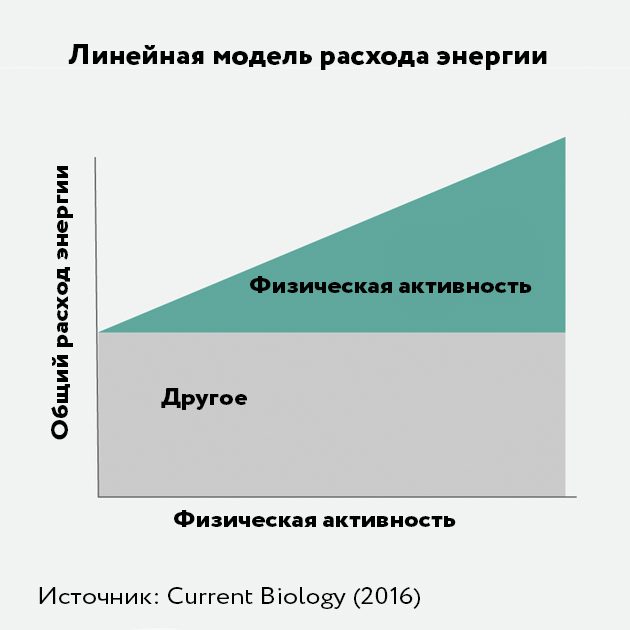
Based on his research, Pontzer proposed a model of limited energy consumption: it shows that the effect of additional physical activity is not linear for the human body. According to the evolutionary theory, when food sources were unreliable, the body set a limit for energy expenditure, independent of the amount of physical activity.
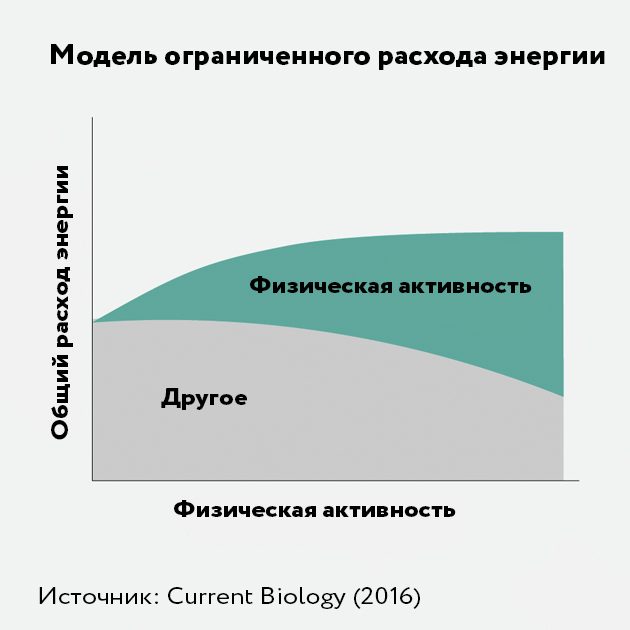
At the moment, this hypothesis is a curious explanation of why the trips to the gym as the only means for losing weight do not work.
The government and the food industry give unscientific advice
Since 1980, the prevalence of overweight has doubled, and, according to the World Health Organization, 13% of the world’s population are obese. In the US, about 70% of people suffer from excess weight or obesity.
As the equivalent reasons for this problem, lack of physical activity and too high-calorie food. This was argued by researchers in an article published in the British Medical Journal, saying: “You can not escape from a bad diet.”
Unfortunately, we lose the fight with excess weight, because we eat more than ever. But the myth of sport is still regularly maintained by the food industry and beverage manufacturers, which may be in disfavour due to the sale of harmful products.
Coca-Cola has been promoting physical activity since the 1920s: “Physical activity is vital for the health and welfare of consumers.” And recently the New York Times announced that Coca-Cola is sponsoring research into the fight against obesity, whose goal is to prove that the cause of the epidemic of obesity is the lack of physical activity.
PepsiCo and other companies are also trying to encourage us to play sports more, continuing to use their products.
But this is an inadequate and potentially dangerous approach, as it encourages people to ignore or underestimate the impact of consumed calories. Sport is good for health. But if you are trying to lose weight, then the biggest problem is food.
So what to do to lose weight?
A study from the National Weight Control Register examined and analyzed the characteristics, habits and behavior of adults who lost at least 13 kg and maintained a new weight for at least a year. Currently, 10,000 people participate in the study, who fill out questionnaires every year, telling how they manage to maintain a normal weight.
The researchers found common habits among the participants in the experiment: they weighed at least once a week, limited calorie intake and too fatty foods, monitored the size of portions and regularly engaged in sports.
But notice: physical activity is used as an addition to calculating calories and other behavioral changes. Any reliable expert in the field of weight loss will say: the best thing to do to lose weight is to limit the number of calories and focus on a healthier diet.
In general, a diet combined with exercise is more useful for overall health than one reduction in calorie content of food, but can only slightly affect weight loss. The graph below shows that a group of people who limited caloric intake lost weight at almost the same speed as a group that followed a diet and added physical activity.
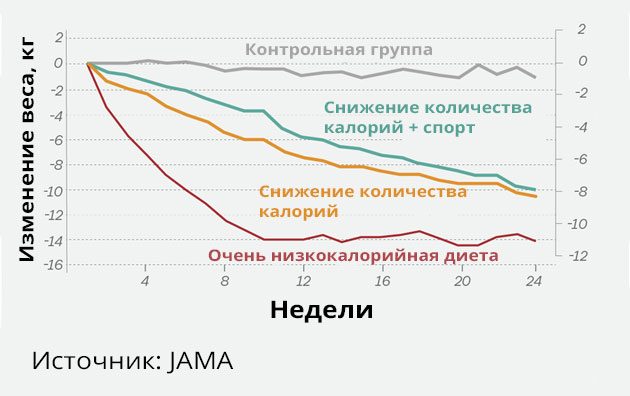
And if you choose for yourself the second option – diet + sports, – be vigilant in calculating calories and do not compensate for the energy expended during physical exertion with additional portions of food.




